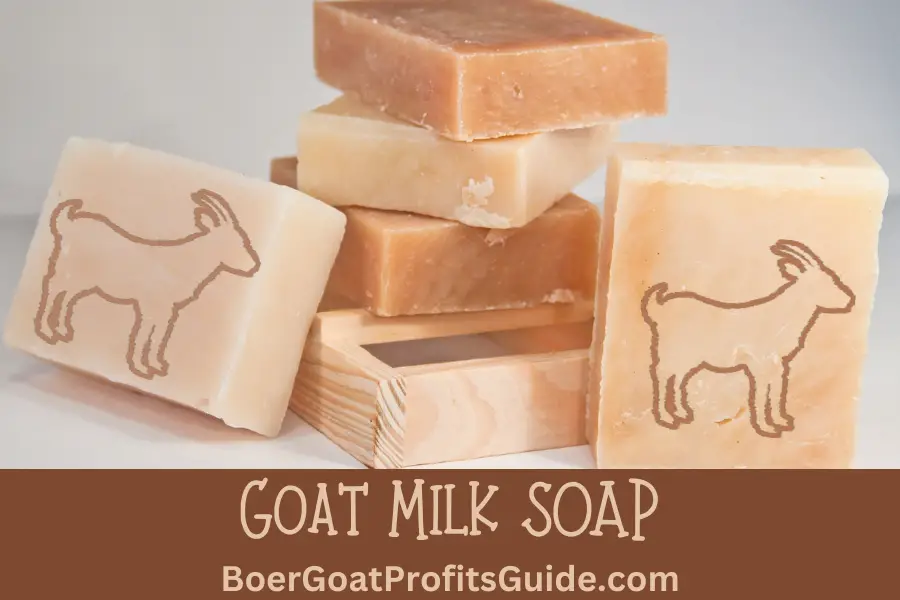
Goat milk soap has recently gained popularity as a natural and gentle alternative to commercial soaps. With consumers increasingly opting for products with minimal ingredients and soothing properties, goat milk soap proves to be an ideal choice backed by a long history of use. Goat milk adds a creamy richness to soap, providing excellent moisturizing characteristics along with essential vitamins, alpha hydroxy acids, and minerals that benefit skin health.
Table of contents
Goat Milk Soap Uses
This versatile soap has various purposes, from being a body wash and face wash to shampoo, bubble bath, and even a shaving cream. Its nourishing properties make it an all-in-one solution for individuals with sensitive skin or those who suffer from skin conditions such as eczema, psoriasis, or rosacea. Furthermore, goat milk soap is known to help in exfoliation, pH balance and caseins providing a luxurious and rejuvenating experience.
Key Takeaways
- Goat milk soap is a natural and gentle alternative to commercial soaps, known for its nourishing properties and minimal ingredients.
- Ideal for sensitive skin and various skin conditions, this versatile soap serves as an all-in-one solution for skincare.
- Not only does it provide numerous benefits to the skin, but it also offers a sustainable and environmentally friendly option in personal care products.
History of Goat Milk Soap
Origins
The earliest evidence of soap-like substances dates back to around 2800 BCE in ancient Mesopotamia (present-day Iraq). In these early versions, fats and ashes were mixed to create a thick cleaning product. By approximately 1500 BCE, ancient Egyptians were using animal and vegetable oils combined with alkaline salts to create soap-like substances for treating skin diseases and washing.
Traditional Uses
Around 600 BCE, the Phoenicians began using soap for cleaning wool, cotton, and textiles in preparation for weaving and dyeing rather than for human washing. Over time, the practice of using soap for personal hygiene became more common, and goat milk was recognized for its soothing properties and minimal ingredients. Today, goat milk soap is appreciated for its natural composition and its ability to soothe and moisturize the skin.
Benefits of Goat Milk Soap
Goat milk soap has numerous benefits for the skin, thanks to its natural ingredients and moisturizing properties. Let’s dive into some of the key benefits: Moisturizing Properties, Skin Soothing Effects, and Sensitive Skin Friendliness.
Moisturizing Properties
Goat milk soap is known for its natural moisturizing properties. Being an emollient, it helps to soften and hydrate the skin, making it feel smoother and healthier. Some reasons contributing to its moisturizing benefits include:
- Creamy texture: Goat milk soap has a creamy texture, which helps your skin lock in moisture.
Rich in nutrients: The soap is rich in vitamins, minerals, and amino acids, essential for maintaining healthy and nourished skin.
Skin Soothing Effects
Another significant advantage of using goat milk soap is its skin-soothing effects. This soap may help to alleviate skin irritation and may reduce the symptoms of eczema and psoriasis. Some factors contributing to its skin-soothing benefits are:
Gentle: Goat milk soap is gentle on the skin, making it suitable for people with sensitive skin or skin conditions.
Lactic acid: The naturally occurring lactic acid in goat’s milk soap helps to cleanse and exfoliate the skin gently, without causing irritation.
Sensitive Skin Friendliness
Goat milk soap is considered friendly for sensitive skin due to its gentle, skin-nourishing, and soothing properties. Some aspects making it suitable for sensitive skin include:
Free of harsh surfactants: Goat milk soap is made without harsh surfactants, reducing the chances of skin irritation.
Brightens skin tone: This soap may also contribute to brightening the skin tone, leaving a healthy glow.
Goat milk soap is an excellent choice for those seeking a natural skincare option with numerous benefits, particularly for those with sensitive or irritated skin.
Ingredients and Preparation of Goat’s Milk Soap

Goat Milk Base
To start with the goat milk base, you will need the following ingredients:
- 3.5 ounces (100 g) of goat milk
- 3.5 ounces (100 g) of water
- 3.8 ounces (109 g) of sodium hydroxide
- 7 ounces (200 g) of refined coconut oil
- 5 ounces (150 g) of shea butter
- 14 ounces (400 g) of olive oil
- 1.76 ounces (50 g) of castor oil
These ingredients are mixed together to create the goat milk soap base.
Essential Oils and Additives Need for Goat’s Milk Soap
In addition to the goat milk base ingredients, you will need essential oils and additives to make your goat milk soap unique. Some common essential oils include lavender, peppermint, or eucalyptus, while additives can range from oatmeal to honey or dried herbs.
When choosing essential oils or additives, keep in mind:
- The scent, as it will contribute to the overall aroma of the soap
- The properties of the oils, as different oils have various benefits for your skin
- The amount, adding 1.5 to 2 ounces of fragrance or essential oils for a balanced scent
Cold Process Technique for Goat Milk Soap
The cold process technique is the most popular method employed in goat milk soap making. It involves making a lye solution, and then mixing in essential oils and goat milk. Then you pour it into a mold and cure it. Complete instructions and much more can be found in our Goat Milk Soap Recipe article.
Types of Goat Milk Soap
Goat milk soap is an excellent alternative for individuals with sensitive skin, as it contains rich fatty acids and nutrients that nourish and hydrate the skin. There are various types of goat milk soap available to suit different preferences and skin types.
Scented Varieties
Most goat milk soaps come in a wide range of fragrances, catering to diverse preferences. Some popular scented options include lavender, citrus, and eucalyptus, which are known for their soothing and uplifting qualities. Some manufacturers may use essential oils in their soaps to provide a natural source of fragrance.
For example:
- Lavender Goat Milk Soap: This soap carries a calming and relaxing lavender scent, making it perfect for unwinding after a long day.
- Citrus Goat Milk Soap: The refreshing scent of citrus fruits like lemon or orange can invigorate your senses in the morning.
Medicinal Soaps
Certain goat milk soaps are specifically formulated with medicinal properties to address various skin concerns. These soaps may contain additional ingredients such as essential oils, herbs, or plant extracts, providing specific therapeutic benefits for a variety of skin issues.
For example:
- Oatmeal and Honey Goat Milk Soap: This soap combines the soothing properties of oatmeal, which can gently exfoliate and reduce inflammation, with the skin-repairing abilities of honey. It is ideal for individuals with dry or sensitive skin conditions, such as eczema or psoriasis.
- Activated Charcoal Goat Milk Soap: Activated charcoal is known for its ability to deep-clean pores and detoxify the skin. This soap may help with acne-prone skin by removing impurities and excess oil.
Environmental Impact
Sustainable Production
Goat milk soap production can contribute to more sustainable practices in the dairy industry. Many smaller goat farms sell milk locally or use it to create artisanal cheese or goat milk soap, which are easier to store and transport. This reduces the environmental impact through localized production and distribution, as well as decreased transportation and storage requirements.
Moreover, as the global demand for eco-friendly products increases along with the concern for resource utilization and the environment, dairy goat production is expected to adapt and become more sustainable over time. By focusing on producing more with less, this industry can contribute positively to the environment and sustainable practices.
Biodegradable Effects
Goat milk soap is an environmentally friendly option compared to other types of soaps. It is easily biodegradable, meaning it breaks down over time without causing harm to the environment. This is particularly important for reducing water pollution and protecting aquatic ecosystems.
In addition, a study on the environmental impacts of soaps and their packaging found that bar soaps have a lower environmental impact than liquid soaps in important categories, such as carbon footprint, eco-toxicity, ozone depletion potential, and eutrophication potential. As goat milk soap commonly comes in bar form, it presents an eco-friendly alternative for consumers looking to make more environmentally conscious choices in their everyday lives.
Purchasing Goat Milk Soap
Which brand of goat milk soap is best?
There are many excellent goat milk soap brands available in the market. One example is Our Earth’s Secrets, which offers an unscented Goat’s Milk Melt And Pour Soap Base containing 10% goat’s milk.
Where to buy Goat Milk’s soap near me?
You can find goat milk soap in local health shops, specialized soap stores, farmers’ markets, and online retailers. Popular platforms like Amazon, Etsy, and other e-commerce websites often carry a wide range of goat milk soap brands.
Video Goat Milk Soap Benefits
In this video by Joy Lane Farm, Joel a second generation soapmaker, describes the benefits of goat milk soap.
Frequently Asked Questions
Yes, goat milk soap is good for the skin. It contains natural ingredients and provides several benefits for the skin, such as hydration and nourishment. Goat milk is rich in vitamins, minerals, and fatty acids that help improve skin health.
Some dermatologists may recommend goat milk soap, especially for those with sensitive skin or skin conditions like eczema or psoriasis. However, it’s essential to consult your dermatologist for individual recommendations based on your skin type and condition.
Goat milk soap offers various benefits for the skin, including:
Hydration: Goat milk contains natural fats that moisturize and nourish the skin.
Gentle Exfoliation: Goat milk contains alpha-hydroxy acids like lactic acid that gently exfoliate the skin, promoting a healthy glow.
Soothing: Goat milk soap is known to be soothing and calming for sensitive skin types, helping to reduce redness and inflammation.
Nutrient-rich: Goat milk is packed with vitamins and minerals that support healthy skin, like Vitamin A, B2, C, and D.
To make goat milk soap at home, start by assembling all the required materials and ingredients. Follow these simple steps:
(1) Gather goat milk, oils (such as coconut oil, olive oil), lye, and other desired additives like essential oils or natural colorants.
(2) Melt the oils in a pot over low heat.
(3) Slowly add lye to the goat milk while stirring gently. This will create your soap base.
(4) Combine the melted oils and the goat milk mixture, stirring until it reaches a thick consistency.
(5) Add any additional ingredients like essential oils, colorants, or exfoliants.
(6)Pour the soap mixture into a mold or container and let it set for a day or two.
(7)Remove the soap from the mold, and allow it to cure for at least four weeks before using it.




